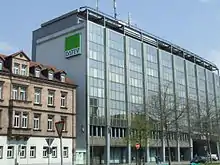 | |
| Type | registered cooperative |
|---|---|
| Industry | Information technology, management consulting |
| Founded | 1966 |
| Headquarters | , |
Key people | Robert Mayr (CEO) |
| Products | Data processing, Software |
| Revenue | 1.31 billion Euro (2022)[1] |
Number of employees | 8,675 (June 30, 2023)[1] |
| Website | www.datev.de |
DATEV is a german software house based in Nuremberg, registered as cooperative society (i.e. "eG"). The company is a technical information services provider for tax consultants, auditors and lawyers as well as their clients such as medium-sized companies, municipalities, associations and institutions. The co-operative's focus is on the tax market.
History

DATEV was founded on 14 February 1966, by 65 tax agents in the Nuremberg area to provide accounting services to its clients with the help of a computer.[2] Its original name was DATEV Data Processing Organization for Tax Agents and Related Tax Services Providers within the Federal Republic of Germany, a registered co-operative society with limited liability ("Datenverarbeitung und Dienstleistung für den steuerberatenden Beruf").[3] The initiators were Heinz Sebiger, the 1997 honorary citizen of Nuremberg, and Joachim Mattheus.
The organisation was established to apply new applications of IT to accounting practices, because of an existing workforce shortage and the imminent introduction in 1968 of VAT. The initial DATEV services were to be completely data center based. All data was to be entered into data collection devices held "on-site" at each accountant's office which would then be sent as a tape by mail to the data center or "Registry" where they were processed and duly returned by mail to each respective accountant's office as processed tax return reports.
The initial data center services were provided by IBM until DATEV established its own center in 1969. In 1974, DATEV offered its members a data by dial up service to replace the mail delivery of data on tape to the Registry. The resulting returns and reports (e.g. payrolls, accounting reports, taxes or stocks) continued to be delivered to members via post. In 1984 work commenced on creating software to allow end client data to be processed directly "in-house" (i.e. "on-site" in each members office) in preference to being processed at the data center "Registry". The first "in-house" software applications were made available to members in 1989.
The initial "in-house" software was based on the IBM operating system known as OS/2. In 1998 the "in-house" software was made available to its members on Microsoft Windows, as it was clear that the OS/2 operating system was going to be phased out.
In 1998, DATEV also began to focus on delivering more "in-house" business software services, consulting and training based on the increased demand by members. In response to the use of centrally held resources ("cloud computing"), an additional data center location was set up in spring 2011. Today, DATEV supports network-based solutions, on-premise software and hybrid models.
Legal
The organisation is a registered cooperative. Membership is only open to members of the tax, audit, accountancy and legal professions.[4]
Business

Solutions for accounting: The accounts of 2.5 million, mostly medium-sized companies are prepared by the tax advisors or within the company itself using DATEV software.[6] Accordingly, DATEV is also a synonym for a German standard of IT-supported accounting.
Solutions for human resources management: In 2018, around 14 million payrolls were created each month using DATEV software. Of these, around 80 percent are generated at the DATEV data, printing and logistics center in Nuremberg, while an estimated 20 percent are generated directly on site at companies and law firms using DATEV PC programs.
Solutions for tax declaration
Data distribution and information provision: Information is exchanged between medium-sized companies and their tax advisors as well as around 200 institutions in Germany via DATEV data center in a largely automated manner - including tax authorities, social insurance carriers, health insurance companies, banks, employers' liability insurance associations or statistical offices. In this way, DATEV supports small and medium-sized enterprises in the reporting obligations that increasingly have to be completed electronically as part of various e-government projects. Databases provide DATEV members full-text access to more than 530,000 documents covering tax, civil, commercial and corporate law.
Security services: data protection and security has always been part of DATEV’s corporate culture to in order to guarantee the professional confidentiality of its members. Based on the relevant know-how, the cooperative also developed a range of security services, from protection of Internet access as well as computers and networks, data backup and options for secure use of mobile work equipment, to differentiated consulting services and physical protection of business premises. For example, users can take advantage of a managed security service that uses the law firm's or company's own communications equipment (DSL) to dial into the DATEV data center exclusively via VPN tunnel. DATEVnet users are routed to the Internet via a central security zone at DATEV. This zone contains tiered and redundant protection systems, such as virus scanners and firewall systems, which are permanently monitored and updated by security specialists. DATEV also offers secure e-mail traffic with cascaded, central virus scanning and encrypted mails. A special characteristic is the so-called reverse scan, where copies of all e-mails that were sent to the users within DATEVnet are constantly reviewed over twelve-hour periods in a central storage buffer, where they are continuously scanned for data infections. Viruses, trojans and keyloggers are quickly detected minimizing any data unwanted infection or manipulation. To complete the protective belt a revers Web radar scan was also introduced into DATEVnet. The Web-radar is a multi-level security concept with both static and dynamic protection filters. Every web page accessed over the last 24 hours is reviewed to identify to origin of any infection or data corruption.
Consulting: DATEV Consulting advises law firms and, in cooperation with their tax advisors, also companies on strategic and organizational issues as well as on the use of information technology as well as security and data protection.[7]
Solutions for Auditing: In addition to products for auditing with working papers, checklists and templates for audit reports, DATEV offers services for quality control and assurance as well as digital data analysis.
Solutions for lawyers: DATEV has been active in the legal market since 1998. Core of the specific portfolio is the law firm system Anwalt classic pro.[8]
Software for municipalities and municipal enterprises: Administrations are increasingly turning to business management concepts. Together with its tax advisors, DATEV provides consulting services specially adapted to municipal needs, as well as a software system covering all aspects of financial management.
Training and further education
Print and logistics center
Strategic direction
In 1998 former CEO Dieter Kempf led an initiative to add a second leg to its business by entering the legal services market. DATEV's takeover of the Hamburg-based company "MCT" brought the software "Phantasy" in its product portfolio. After a professionally and "politically" difficult start-up phase in the then crowded legal services market DATEV now offers "Software for lawyers" that are in the top five of their league including RA-MICRO, AnNoText, ReNoStar / ReNoFlex.
DATEV first attempts to deliver "services for lawyers" meant finding qualified legal partners with the required legal and IT backgrounds. Soon after the successful establishment of the legal services market, the DATEV product range was extended again with the offer of "audit" software for accountants.
In early 2000, internal disputes arose amongst the cooperative members with regard to DATEV's offer of software directly to end clients i.e. non-professionals. With the founding of the "IDA" (Association of DATEV Users), a cooperative-oriented antipole was formed within the members. The tension between "cooperative obligation" (i.e. the cooperative should only do what directly benefits the cooperative members) and "economic success" (the co-operative should do all it can to be economically successful) became evident.
The controversy resulted in the calling of an extraordinary members meeting on 18 February 2005. In the meeting, DATEV members voted to amend the existing co-operative statute by a majority of 86.5% and the approval and support of the IDA to allow for the provision of software directly to end clients. The provision of such direct services became known as "bound member client business" and requires the prior consent of the consultant, which can also be withdrawn.
With an amendment to the articles of association in 2018, DATEV is also able to establish direct business relationships with other non-members if it serves its main purpose. Following the market trend, the company plans to convert its product portfolio largely to cloud services, which until then had mainly consisted of in-house solutions.
DATEV has also been active abroad since 2000. Its international involvement currently includes the Czech Republic, Slovakia, Austria, Italy, Poland, Spain and Hungary.
Products
DATEV's range of services primarily covers the areas of accounting, human resources management, business advisory, taxes, and organization and planning. It extends from more than 200 PC programs, cloud services such as online applications, data processing and archiving in the data center, outsourcing and security services. The portfolio is rounded off by consulting and knowledge transfer in Germany and some other European countries.
Platforms
DATEV assumes that customers are using Microsoft operating systems. For Apple users, emulators exist that make the programs executable on Mac computers. Data is stored via the Microsoft SQL Server. In addition to supporting Microsoft Office formats, most of the programs were also equipped with interfaces to OpenOffice.org; support for OpenOffice was discontinued due to insufficient demand in 2017.[5]
DATEV programs also have accepted interfaces to the ERP systems SAP Business One, SAP Business ByDesign and Microsoft Dynamics NAV.
Sponsorship
DATEV is a sponsor of the Challenge Roth. The contract was extended, DATEV will be the title sponsor for another 3 years from 2022.[6]
Subsidiaries
- DATEV IT Dienstleistungs- und Service GmbH, Nuremberg, Germany
- DATEV.at GmbH / Vienna, Austria
- DATEV.cz sro / Brno, Czech Republic
- DATEV.pl sp. z o.o. / Warsaw, Poland
- DATEV koinos. Sr.l. / Milan, Italy
- DATEV.it S.p.A. / Assago, Italy
- DATEV Beteiligungen GmbH, Nuremberg, Germany
- TeleLex GmbH i. L., Nuremberg, Germany
- adorsys GmbH & Co. KG, Nuremberg, Germany
- adorsys Verwaltungs GmbH, Nuremberg, Germany
- fino taxtech GmbH, Kassel, Germany
Key data
- Turnover 2022: €1.31 billion
- Members: 40,168 (June 30, 2023)
- Employees: 8,675 (June 30, 2023)
References
- 1 2 "...what you should know about DATEV". DATEV. Retrieved 2018-10-13.
- ↑ "Chronologischer Überblick 1966 bis 1976". DATEV. Archived from the original on 2010-04-03. Retrieved 2010-02-26.
- ↑ "Gemeinsames Registerportal der Länder". Archived from the original on 2016-12-16. Retrieved 2010-02-26.
- ↑ "Mitglied bei DATEV". DATEV. Archived from the original on 2010-03-01. Retrieved 2010-02-26.
- ↑ "Apache OpenOffice und die DATEV-Programme" (in German). DATEV. 2017-05-16. Retrieved 2018-10-21.
- ↑ "Datev bleibt Titelsponsor des Challenge Roth". nordbayern.de. Verlag Nürnberger Presse Druckhaus Nürnberg GmbH & Co. KG. 2021-02-08. Retrieved 2021-05-16.
External links
 Media related to DATEV at Wikimedia Commons
Media related to DATEV at Wikimedia Commons- DATEV
- DATEV International Site
- Sinfopac Internacional, S.L.U - DATEV Partner for Solutions